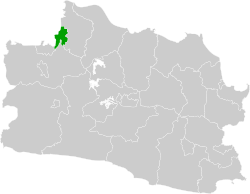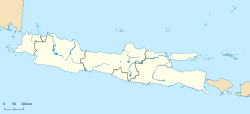
Back Bekasi Afrikaans بيكاسي Arabic Bekasi AST Bekasi Azerbaijani بکاسی AZB Kota Bekasi BAN Бекасі Byelorussian Bekasi Kota BEW Бекаси (Индонезия) Bulgarian Bekasi BUG
Bekasi | |
|---|---|
| City of Bekasi Kota Bekasi | |
| Other transcription(s) | |
| • Sundanese | ᮘᮨᮊᮞᮤ |
| Nickname(s): Kota Patriot (City of the patriots) | |
| Motto(s): Bekasi Maju, Sejahtera dan Ihsan (Bekasi for the Developed, Prosperous, and Good people) | |
 Location within West Java | |
Location in Java | |
| Coordinates: 6°14′06″S 106°59′32″E / 6.2349°S 106.9923°E | |
| Country | |
| Region | Java |
| Province | |
| Government | |
| • Mayor | R. Gani Muhamad (acting) |
| • Vice Mayor | Vacant |
| Area | |
| • Total | 213.12 km2 (82.29 sq mi) |
| Elevation | 11–81 m (36–265 ft) |
| Population (mid 2023 official estimate) | |
| • Total | 2,513,669 (3rd) |
| [1] | |
| Time zone | UTC+7 (Indonesia Western Time) |
| Area code | (+62) 21 |
| Vehicle registration | B |
| Website | bekasikota.go.id |
Bekasi (Indonesian pronunciation: [ˈbəkasi], Sundanese: ᮘᮨᮊᮞᮤ) is the city with the largest population in the province of West Java, Indonesia, located on the eastern border of Jakarta. It serves as a commuter city within the Greater Jakarta. According to the 2020 Census by Statistics Indonesia (BPS), Bekasi had 2,543,676 inhabitants.[2] The (revised) official estimate for mid 2023 was 2,513,669.[1] It lies within the largest metropolitan area in Indonesia (Jabodetabek). The city is bordered by Bekasi Regency (from which the city was separated administratively on 16 December 1996) to the north and the east, Bogor Regency and Depok City to the south, and the city of East Jakarta to the west.
Bekasi is one of the oldest cities in Indonesia, and has a history of being the capital city of the Kingdom of Tarumanagara. At that time, the name of Bekasi was Dayeuh Sundasembawa or Jayagiri. The earliest evidence of its existence dates from the fifth century according to the Tugu inscription, which describes the name of two rivers that run through the city, i.e. Candrabhaga and Gomati and one of those rivers, i.e. Candrabhaga is the origin of the name Bekasi where the name Candrabhaga evolved into "Bhagasasi" - due to the Sanskrit word candra (which means moon) evolved into Old Sundanese word 'sasi' which also means moon - and then the name Bhagasasi was mis-spelt as "Bhagasi", and then the Dutch colonial government also mis-spelt the name Bhagasi as "Bacassie", and finally it became "Bekasi".[3] During the Dutch East Indies period, Bekasi was a part of Batavia residency. As a dormitory city, many middle class satellite areas have been developed in Bekasi,[4] complete with their own shopping malls, schools, hospitals, club houses, water park, and shuttle bus services to central Jakarta. The large number of multinational companies has apparently attracted many expatriates (mainly Japanese and Korean) to settle in Bekasi.[5]
- ^ a b Badan Pusat Statistik, Jakarta, 26 September 2024, Kota Bekasi Dalam Angka 2024 (Katalog-BPS 1102001.3275)
- ^ Badan Pusat Statistik, Jakarta, 2021.
- ^ http://www.bekasikota.go.id Sejarah Kota Bekasi
- ^ http://properti.kompas.com Pasar "Middle-up" Bekasi Menggiurkan, Rumah Harga Rp 800 Juta Paling Dicari!
- ^ Peter J. Katzenstein, Takashi Shiraishi; Beyond Japan: The Dynamics of East Asian Regionalism; 2006







